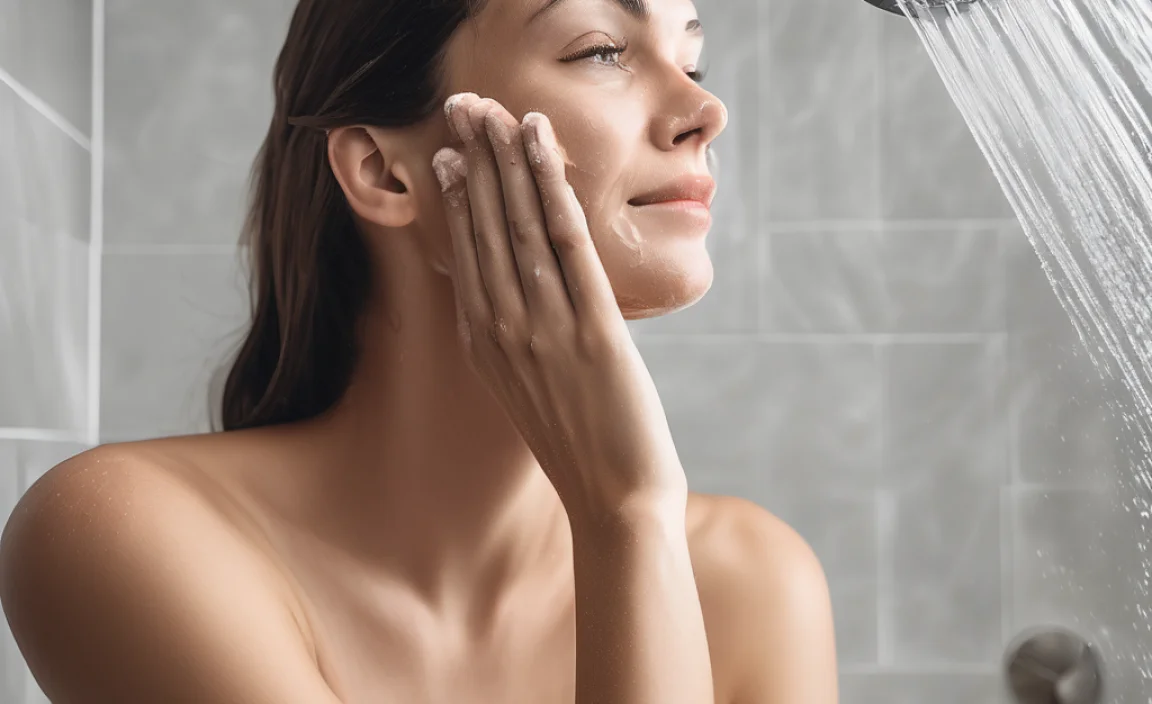Generally, showering once a week might be fine for some people, particularly if they aren’t very active or don’t get very dirty. However, most people benefit from showering more often to maintain good hygiene, prevent body odor, and keep skin healthy. How often you should shower really depends on your lifestyle, skin type, and personal preferences.
Ever wondered if you’re showering too much or too little? It’s a common question! We all want to stay clean and healthy, but life gets busy. Finding the right balance can feel tricky. Maybe you’re super active and shower daily, or perhaps you’re wondering if you can get away with showering just once a week.
Don’t worry, we’ve got you covered! In this guide, we’ll walk you through everything you need to know about how often you should shower. We’ll look at factors like your activity level, skin type, and even the climate you live in. Plus, we’ll give you practical tips to keep your skin happy and healthy, no matter your shower schedule. Ready to find your perfect shower routine? Let’s dive in!
Why Showering Frequency Matters

How often you shower isn’t just about personal preference; it plays a big role in your overall health and well-being. Showering helps remove dirt, sweat, and dead skin cells, keeping your skin clean and preventing body odor. But showering too often can strip your skin of its natural oils, leading to dryness and irritation. Finding the right balance is key to maintaining healthy, happy skin.
The Impact on Skin Health
Your skin is your body’s largest organ, and it has its own ecosystem of natural oils and beneficial bacteria. These oils keep your skin moisturized and protect it from environmental damage. When you shower too frequently, especially with harsh soaps, you can disrupt this natural balance. This can lead to:
- Dryness: Stripping away natural oils leaves your skin feeling tight and dry.
- Irritation: Dry skin can become itchy and irritated, leading to redness and discomfort.
- Eczema flare-ups: Over-showering can worsen conditions like eczema.
- Increased risk of infection: Cracks in dry skin make it easier for bacteria to enter, increasing the risk of infections.
On the other hand, not showering enough can also cause problems. A buildup of dirt, sweat, and dead skin cells can lead to:
- Body odor: Sweat mixes with bacteria on your skin, causing unpleasant smells.
- Skin infections: Bacteria and fungi thrive in dirty environments, increasing the risk of infections like folliculitis (infected hair follicles).
- Acne: Clogged pores can lead to breakouts.
The Role of Personal Hygiene
Beyond skin health, showering is also important for personal hygiene. Regular showering helps remove harmful bacteria and viruses from your skin, reducing your risk of getting sick. It’s especially important to shower after activities that make you sweat, like exercising or working outdoors.
Proper hygiene also involves cleaning specific areas of your body thoroughly, such as your armpits, groin, and feet. These areas are prone to sweating and bacterial growth, so they require extra attention. Using a mild soap and warm water can help keep these areas clean and fresh.
Factors Influencing Shower Frequency

So, how often *should* you shower? The answer isn’t the same for everyone. Several factors can influence how often you need to shower to stay clean and healthy.
Activity Level
If you’re physically active, you’ll likely need to shower more often than someone who isn’t. Exercise and strenuous activities cause you to sweat, which can lead to body odor and clogged pores. Showering after a workout helps remove sweat and bacteria, keeping your skin clean and preventing breakouts.
Consider these scenarios:
- Regular exercise: Showering daily is usually necessary to remove sweat and prevent body odor.
- Light activity: If you only engage in light activities like walking, you may not need to shower every day.
- Sedentary lifestyle: If you spend most of your time sitting, you may be able to shower every other day or even less frequently.
Skin Type
Your skin type plays a big role in how often you should shower. Different skin types have different needs when it comes to hydration and oil production.
- Dry skin: If you have dry skin, showering too often can strip away natural oils and worsen dryness. Showering every other day or less frequently may be better, and using moisturizing soaps and applying lotion afterward is essential.
- Oily skin: If you have oily skin, you may need to shower more frequently to remove excess oil and prevent breakouts. Showering daily or even twice a day may be necessary, but be careful not to overdo it, as this can lead to dryness and irritation.
- Normal skin: If you have normal skin, you can usually shower daily without any problems. Just be sure to use a mild soap and avoid hot water, which can dry out your skin.
- Sensitive skin: If you have sensitive skin, you need to be extra careful with your shower routine. Use fragrance-free, hypoallergenic soaps and avoid scrubbing your skin too hard. Showering every other day or less frequently may be better to prevent irritation.
Climate and Environment
The climate you live in can also affect how often you need to shower. Hot, humid climates can cause you to sweat more, requiring more frequent showers. Cold, dry climates, on the other hand, can dry out your skin, making less frequent showers a better option.
Consider these factors:
- Hot, humid weather: Showering daily or even twice a day may be necessary to remove sweat and prevent body odor.
- Cold, dry weather: Showering every other day or less frequently may be better to prevent dry skin.
- Air pollution: If you live in an area with high air pollution, showering daily can help remove pollutants from your skin.
Personal Preferences
Ultimately, how often you shower is a personal decision. Some people simply feel better when they shower daily, while others prefer to shower less frequently. Listen to your body and adjust your shower routine to fit your needs and preferences.
Think about what makes you feel most comfortable and confident. If you feel clean and fresh showering every other day, that’s perfectly fine. If you prefer to shower daily, that’s fine too. The key is to find a routine that works for you and keeps your skin healthy.
The Once-a-Week Shower: Is It Enough?

Now, let’s address the question at hand: Is showering once a week enough? The answer, as you might have guessed, depends on the factors we’ve already discussed. For some people, showering once a week might be perfectly adequate. For others, it might not be enough to maintain good hygiene and skin health.
When Once a Week Might Be Okay
There are certain situations where showering once a week might be acceptable:
- Low activity level: If you’re not very active and don’t sweat much, you may not need to shower more than once a week.
- Dry skin: If you have extremely dry skin, showering too often can worsen the condition. Showering once a week can help prevent your skin from drying out.
- Elderly individuals: As we age, our skin tends to become drier and more fragile. Elderly individuals may not need to shower as often as younger people.
- Certain medical conditions: Some medical conditions can make showering difficult or uncomfortable. In these cases, showering once a week may be the best option.
When Once a Week Is Not Enough
In many cases, showering once a week is not enough to maintain good hygiene and skin health. Here are some situations where more frequent showering is necessary:
- High activity level: If you exercise regularly or work a physically demanding job, you need to shower more often to remove sweat and prevent body odor.
- Oily skin: If you have oily skin, showering once a week can lead to clogged pores and breakouts.
- Living in a hot, humid climate: Hot, humid weather can cause you to sweat more, requiring more frequent showers.
- Poor hygiene: Showering once a week can lead to body odor and an increased risk of skin infections.
Alternatives to Full Showers
If you’re trying to reduce your shower frequency but still want to stay clean, there are several alternatives to full showers that you can try:
- Spot cleaning: Use a washcloth and warm water to clean areas that tend to sweat or produce odor, such as your armpits, groin, and feet.
- Bird baths: Wash your face, neck, and chest with a washcloth and warm water.
- Dry shampoo: Use dry shampoo to absorb oil and refresh your hair between washes.
- Body wipes: Use body wipes to clean your skin when you don’t have time for a full shower.
Tips for Healthy Showering Habits
Whether you shower daily or less frequently, it’s important to follow healthy showering habits to protect your skin and maintain good hygiene. Here are some tips to keep in mind:
Use Lukewarm Water
Hot water can strip your skin of its natural oils, leading to dryness and irritation. Stick to lukewarm water when showering to protect your skin’s moisture barrier.
Choose Mild Soaps
Harsh soaps can also dry out your skin. Choose mild, fragrance-free soaps or cleansers that are designed for sensitive skin. Look for products that are labeled as “non-comedogenic,” meaning they won’t clog your pores.
Limit Shower Time
Long showers can also dry out your skin. Try to limit your shower time to 5-10 minutes to prevent excessive moisture loss.
Pat Your Skin Dry
Instead of rubbing your skin dry with a towel, pat it gently to avoid irritation. Leaving a little moisture on your skin can help it stay hydrated.
Moisturize After Showering
Apply a moisturizer immediately after showering to lock in moisture and prevent dryness. Choose a moisturizer that is appropriate for your skin type. For dry skin, look for thick, creamy moisturizers. For oily skin, opt for lightweight, oil-free lotions.
Exfoliate Regularly
Exfoliating your skin can help remove dead skin cells and prevent clogged pores. Exfoliate once or twice a week using a gentle scrub or exfoliating brush. Be careful not to over-exfoliate, as this can irritate your skin.
Clean Your Shower Regularly
Your shower can be a breeding ground for bacteria and mold. Clean your shower regularly with a disinfectant cleaner to prevent the growth of harmful microorganisms. Pay special attention to the showerhead, which can harbor bacteria.
Creating a Shower Schedule That Works for You
Finding the right shower schedule is a personal journey. Here’s how to create a routine that fits your lifestyle, skin type, and preferences:
Assess Your Needs
Start by considering your activity level, skin type, and climate. Do you exercise regularly? Do you have dry, oily, or sensitive skin? Do you live in a hot, humid climate or a cold, dry one? Answering these questions will help you determine how often you need to shower.
Experiment and Adjust
Don’t be afraid to experiment with different shower frequencies to see what works best for you. Try showering daily, every other day, or even less frequently. Pay attention to how your skin feels and adjust your routine accordingly. If your skin feels dry and irritated, try showering less often. If you feel oily and unclean, try showering more often.
Listen to Your Body
Your body will tell you when it needs a shower. Pay attention to signs like body odor, oily skin, or a feeling of uncleanliness. Adjust your shower routine based on these cues.
Be Flexible
Your shower schedule doesn’t have to be set in stone. Be flexible and adjust your routine as needed based on your activities and circumstances. If you have a particularly sweaty workout, you may need to shower more often. If you’re traveling to a cold, dry climate, you may need to shower less often.
Seek Professional Advice
If you’re unsure about how often you should shower, talk to a dermatologist. A dermatologist can assess your skin type and provide personalized recommendations for your shower routine.
Summary Table: Shower Frequency Guidelines
| Factor | Recommended Shower Frequency | Additional Tips |
|---|---|---|
| High Activity Level | Daily | Use mild soap, moisturize after showering |
| Low Activity Level | Every other day or less | Focus on spot cleaning |
| Dry Skin | Every other day or less | Use moisturizing soap, apply lotion immediately after showering |
| Oily Skin | Daily or twice a day | Use oil-free cleanser, avoid over-showering |
| Hot, Humid Climate | Daily | Use mild soap, stay hydrated |
| Cold, Dry Climate | Every other day or less | Use moisturizing soap, apply lotion frequently |
Frequently Asked Questions (FAQs)
1. Is it bad to shower every day?
Showering every day isn’t necessarily bad, but it can strip your skin of natural oils, leading to dryness. If you shower daily, use lukewarm water and a mild soap, and always moisturize afterward.
2. What happens if you don’t shower for a week?
If you don’t shower for a week, you may experience body odor, oily skin, and an increased risk of skin infections. Dead skin cells and bacteria can build up, leading to these issues.
3. Can showering too much cause skin problems?
Yes, showering too much can cause skin problems like dryness, irritation, and eczema flare-ups. Over-showering can disrupt your skin’s natural moisture barrier, making it more vulnerable to these issues.
4. What’s the best time of day to shower?
The best time of day to shower is a matter of personal preference. Some people prefer to shower in the morning to wake up and feel refreshed, while others prefer to shower at night to relax and unwind before bed. Healthline offers more insights on the pros and cons.
5. How can I keep my skin moisturized if I shower frequently?
To keep your skin moisturized if you shower frequently, use lukewarm water, choose a mild soap, limit your shower time, pat your skin dry, and apply a moisturizer immediately after showering.
6. Is it okay to just wash my body with water without soap?
Washing your body with water alone can remove some dirt and sweat, but it won’t effectively remove oil and bacteria. Using soap is important for maintaining good hygiene and preventing body odor.
7. What kind of soap is best for frequent showering?
The best kind of soap for frequent showering is a mild, fragrance-free soap or cleanser that is designed for sensitive skin. Look for products that are labeled as “non-comedogenic” and “hypoallergenic.”
Conclusion
So, is showering once a week okay? It really depends on your individual circumstances. While some people can get away with showering less frequently, most of us benefit from a more regular shower routine to maintain good hygiene and skin health. Consider your activity level, skin type, and climate when determining how often you should shower. And remember, listening to your body is key. If you feel clean and fresh, you’re probably on the right track. If not, it might be time to adjust your shower schedule. With a little experimentation, you can find a routine that works for you and keeps your skin happy and healthy. You got this!

